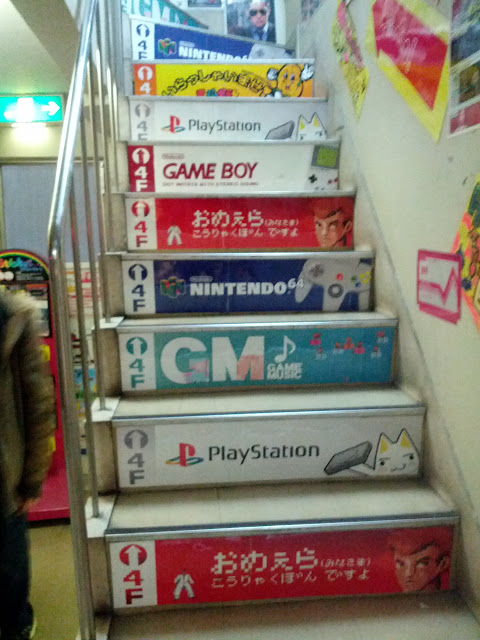As you might be able to gather from reading my other blog, especially my older reviews, I quite like retro video games. But it's not the most accessible hobby, with the major game retailers in the US long having since stopped selling anything more than ten years old. You'd pretty much have to rely on conventions or online shopping to find older stuff. Japan is a little better in this regard, with some anime and game/related stores, like Mandarake, having sections for used retro games. But the crowning jewel of this market has to be Super Potato. Super Potato is actually a small chain with stores across Japan (full list: (Japanese)), but their flagship store is in Akihabara, due west of the train station.
Super Potato occupies the 3rd, 4th, and 5th floor of this black building you see here. The Pac-Man and Donkey Kong characters on it are hard to miss.
There is an elevator in the building you can use, but take the stairs at least once. They are labeled with what is for sale on the next floor up.
Customers are greeted on the 3rd floor by a life-size statue of none other than Mario! But don’t touch! Other "characters" you can see in this pic include the Super & 1-Up Mushrooms and Goomba from Super Mario (top centre), and a Slime from Dragon Quest (top right).
Apart from game hardware and software, you might also find some unique merchandise based on your favourite characters. For example, I picked up a Legend of Zelda deck of playing cards.
The 3rd floor focuses on older consoles (NES, Super NES, Sega Genesis, etc.), and the 4th floor focuses on newer ones (PlayStation 1 & 2, Nintendo 64 & GameCube, etc.). The games shown here are for the Nintendo Famicom, the original Japanese version of the Nintendo Entertainment System (NES) sold in America and Europe. As seen here, loose cartridges are shrink-wrapped for preservation. For example, humidity is a serious problem during summers in Japan. Whatever the reason, you just don’t get that kind of service over in America!
Games are also sold complete-in-box, but cost more.
An aisle of Super Famicom (Super NES) games for sale. Certain games are grouped together instead of by title, for example by publisher (Nintendo, Namco) or genre/theme (role-playing, fighting, anime-licence). The rest are sorted by the consonant of the first syllable. For example, first you have the "blank vowels" (A I U E O), then the 'K's (Ka Ki Ku Ke Ko), the 'S's (Sa Shi Su Se So), et cetera.
Games for the PC Engine, sold abroad as the TurboGrafx-16. While the TG-16 didn't garner so much support abroad (thanks to competition from the Sega Genesis and Super NES), it got hugely popular in Japan and stayed that way for some time. TG-16 games were sold both on solid-state cards (seen on the left) and CDs (to the right).
Now, before you start writing your Super Potato shopping list, please be aware that not all Japanese video games are compatible with American or European hardware. There are different work-arounds available for each console, but the easiest method is just to buy a Japanese console. It’s not necessarily expensive, either -- a used Famicom should cost less than ¥5,000 / US$50. And, of course, there's the language barrier to get over, but this is less of an issue for more action-oriented genres.
The 5th floor hosts some arcade games and light vending options, all guarded over by Metal Gear Solid’s Big Boss.
Simply put, Super Potato is the kind of place where, if they didn't close, I'd never leave!
Hours: Open 11:00 AM to 8:00 PM on weekdays, and 10:00 AM to 8:00PM on weekends. No regular closing days.
Address: 1-11-12 Soto-Kanda, Chiyoda-ku, Tokyo-to 〒101-0021
Access: Super Potato is accessed from Akihabara Station on the JR Yamanote (JY), Keihin-Tohoku (JK), and Tokyo Metro Hibiya (H) lines, or Suehirocho Station on the Tokyo Metro Ginza (G) line. From Tokyo Station, take the Yamanote or Keihin-Tohoku line to Akihabara (JY03/JK27, 4 minutes, ¥160, JR Pass OK).
Directions: From Akihabara Station, turn right out of the Electric Town Exit ticket gates, and immediately left upon exiting the station. Continue straight, cross Chuo-dori, and take the next right afterwards. The Super Potato building will be on your right.
Website: (Japanese)









